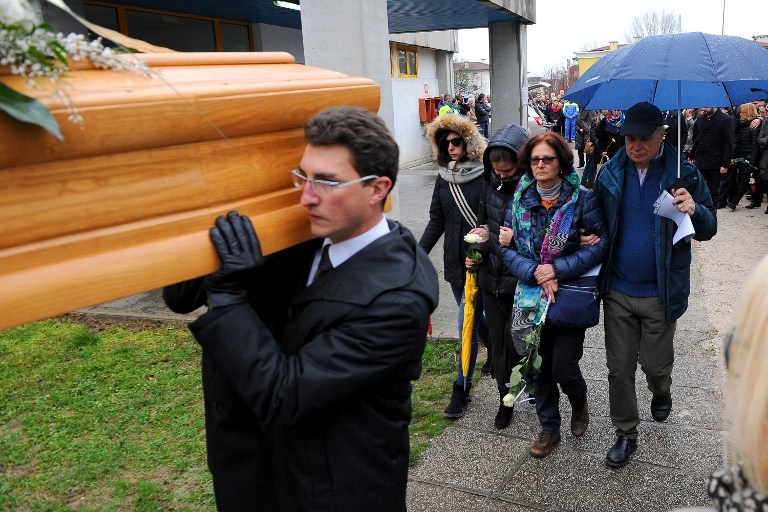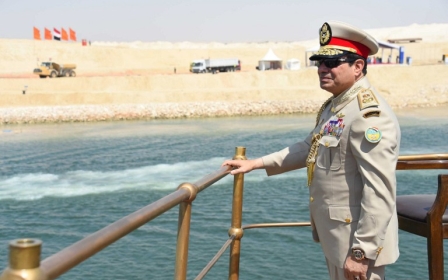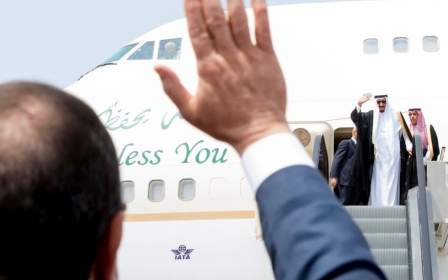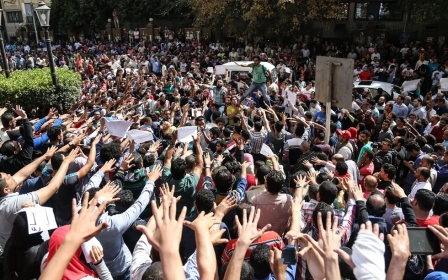One murder too far: How the Regeni case turned the tide on Egypt

An Egyptian folk tale revolves around two men who had a hard-working and faithful ass. They had grown so dependent and attached to the animal that they gave him a name, Abul-Sabr (The Patient One). One day, the animal died and the two men sat over the grave of this animal weeping. As people went by, the grief exhibited by the two brothers, their stories of the deceased’s hard work and worth and the moniker all conspired to create the impression that the deceased was a saint of some sort.
The two men, quick to appreciate the lucrative potential, erected a shrine over the grave of this animal and called it the “Shrine of The Patient One.” Money flowed from penitents, each of whom had a request or prayer from The Saint, the Patient One. One day, the men feuded over the allocation of the income and one invoked the soul of the dead saint in asserting his truthfulness. The other, reminded him, “Really? We buried it together.”
Much has been made of the Egyptian regime’s obtuse response to the Italian government’s request for a thorough, credible and transparent investigation into Giulio Regeni’s murder. Regeni, a PhD student at Cambridge, was in Egypt researching labour movements when he suddenly disappeared on 25 January. His body was eventually found in a ditch with extensive signs of torture.
Unhappily for the Egyptian regime, Regeni’s mother has mounted a relentless campaign for the truth regarding her son’s murder. The Egyptians attempted some rather weak, face-saving manoeuvres that failed to satisfy the Italians. The drama has culminated in Italy withdrawing her ambassador to Cairo, after which the Egyptian Foreign Minister finally declared that Egyptian authorities will attempt to meet the demands of the Italian investigators including some which other Egyptian authorities had earlier declared unconstitutional, only to backtrack a few days later.
The Egyptians must be scratching their heads over the entire episode. In August 2013, this regime perpetrated the single largest massacre of Egyptians in contemporary history. Over 800 Egyptians were killed at Rabaa, in what Human Rights Watch (HRW) described as a pre-planned, act of mass violence by the state likely ordered by very senior leadership, including possibly Sisi personally. Weeks before Rabaa, the regime had killed some 50 Egyptians shortly after morning prayer in front of the Republican Guard headquarters. Two months later, on 6 October, there was another mass killing by security forces during anti-regime protests.
In 2014 and 2015, regime repression spiralled with more abuses: systematic rape and sexual abuse, forced disappearances; extra-judicial killings, more arrests and more torture. Despite the escalating and often public abuses, Sisi found himself received on many a red carpet in several European capitals. Italy and France welcomed the field marshal with open arms in their capitals in November 2014 and Italian PM Matteo Renzi had already visited Cairo earlier in the year. Germany and the United Kingdom followed in 2015, all preceded by the Leader of The Free World who had already met the field marshal in September 2014.
Over the course of the two years following the military coup, a number of prominent Egyptians opposed to the regime warned diplomats in Western Europe and the United States that the Egyptian regime will understand normalisation of relations as a carte blanche for more abuses; silence and so-called quiet diplomacy will fail to move the Egyptian regime towards any mitigation of human rights abuses. We argued that the Egyptian regime will correctly understand the mild condemnations to be nothing more than the trappings of public diplomacy.
I believe that is exactly what happened. The Egyptian regime found its abuses not only unpunished, but indeed rewarded. Democratic governments had asserted that they are unconcerned by the murder of hundreds, if not over a thousand Egyptians, detentions of tens of thousands of other Egyptians, systematic rape, extra-judicial killing and rampant torture and forced disappearances.
And so when, one fine Cairo winter day, Giulio Regeni was caught in the same web of torture and murder, the Egyptians should have reasonably expected nothing to happen. Indeed, the French and the British dutifully played along as before. The British hardly uttered a word, and the French announced plans for a visit to Cairo by Francois Hollande, during which the French president claimed that human rights issues were raised, apparently in between signings of massive trade and weapons deals. The Egyptians had every right to expect that Regeni’s murder can be swept under the carpet and Sisi was confident enough to say so publicly.
What no one counted on was Paola Regeni, who stood up not only for her son, but for all the other Egyptians, unknown and uncelebrated, who fell victim to the brutality of this regime in a similar fashion.
But for her, it would have been business as usual. And, for whatever reason, there has not been a shortage of Egyptian officials coming forward, albeit anonymously, to link the murder to the Egyptian security apparatus and possibly to Sisi himself. The regime has reacted by retaliating against Reuters, who broke the story.
It is still far too early to know how this episode will end, but one can only imagine that senior Egyptian officials’ response to the Italians’ official indignation is some diplomatic form of, “really? We buried it together!”
- Dr Wael Haddara served as a senior advisor to former Egyptian President Mohamed Morsi during his year in office. He tweets at @waelhaddara and blogs at waelhaddara.com.
The views expressed in this article belong to the author and do not necessarily reflect the editorial policy of Middle East Eye.
Photo: Relatives of Giulio Regeni, including his father Claudio (R), mother Paola (C) and his sister Irene (3rd R) follow his coffin during his funeral in Fiumicello on 12 February, 2016. Giulio was found dead bearing signs of torture after disappearing in Cairo (AFP).
New MEE newsletter: Jerusalem Dispatch
Sign up to get the latest insights and analysis on Israel-Palestine, alongside Turkey Unpacked and other MEE newsletters
Middle East Eye delivers independent and unrivalled coverage and analysis of the Middle East, North Africa and beyond. To learn more about republishing this content and the associated fees, please fill out this form. More about MEE can be found here.





